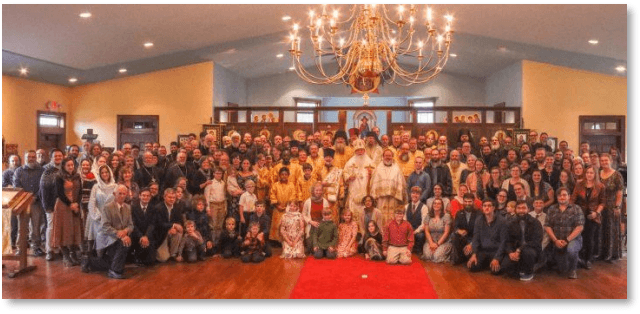Litanies
As members of the Body of Christ, Christians are called to pray for one another. Our needs are many and varied and include: our own personal struggles, the needs of our family and our church family, those in our social sphere (neighbors, school, work), our government, and those in the world who are outside the faith. The Church uses Litanies as a way to petition God and to pray for ourselves and each other. Each petition in a litany is sung and then is followed by either “Lord have mercy” or “Grant this, O Lord.”
In the Divine Liturgy, several litanies are recited at different places in the service and for different reasons. Previously, we discussed both the Great Litany at the beginning of the Divine Liturgy and the litanies between the antiphons. Now we have the litanies that follow the Gospel and the sermon. There is a litany specifically for supplication called the “Augmented”1 Litany, which includes prayers for the Orthodox faithful. There are also litanies for specific groups of people, such as the faithful, the departed, and the catechumens.

In the Augmented liturgy, we specifically petition God for our local community and its needs: our clergy (metropolitan, bishop, priests, deacons, and all other clergy) and our brethren (brothers and sisters in Christ); it is possible to add the names of people, living and departed, as needed on a particular day. We also pray for our country and its president, our civil authorities, our armed forces, the founders of our local parish, and the patriarchs of the Orthodox world who are departed.
The petitions in the Augmented Litany can seem general in nature because they only name the people for whom we pray and then ask for the Lord’s mercy. For example, “We pray for our metropolitan, for our bishop, for priests, deacons, and all other clergy… Lord, have mercy!” There is a sense, when singing these petitions, in which we emphasize that our Lord knows the needs of the clergy (or of the armed forces, etc.), and that we are relying on the wisdom of God to supply their needs.
However, especially in the litanies for the faithful, the departed, and the catechumens, the requests are very specific. This is not to say that we must inform the Lord of their needs, but rather that we would know and understand what their (and our) needs are, what we hope for, and what God provides for us. For example, we pray for the pardon and remission of the sins of the departed, “both voluntary and involuntary,” and that the Lord would establish their souls “where the just repose.” These prayers are illuminating, as they teach us what both we and they hope to receive in the world to come.
These litanies are essential to our personal prayer life as well, as we keep our own lists of the living and the departed and ask God to forgive and redeem them. When we pray for each other, when we learn to pray for those we have never met (such as those who have gone before us), and for those who serve us (the clergy), we are learning to live within the Body of Christ.
Footnotes
-
The Augmented Litany is the Litany of Fervent Supplication with two persons added to the beginning. ↩